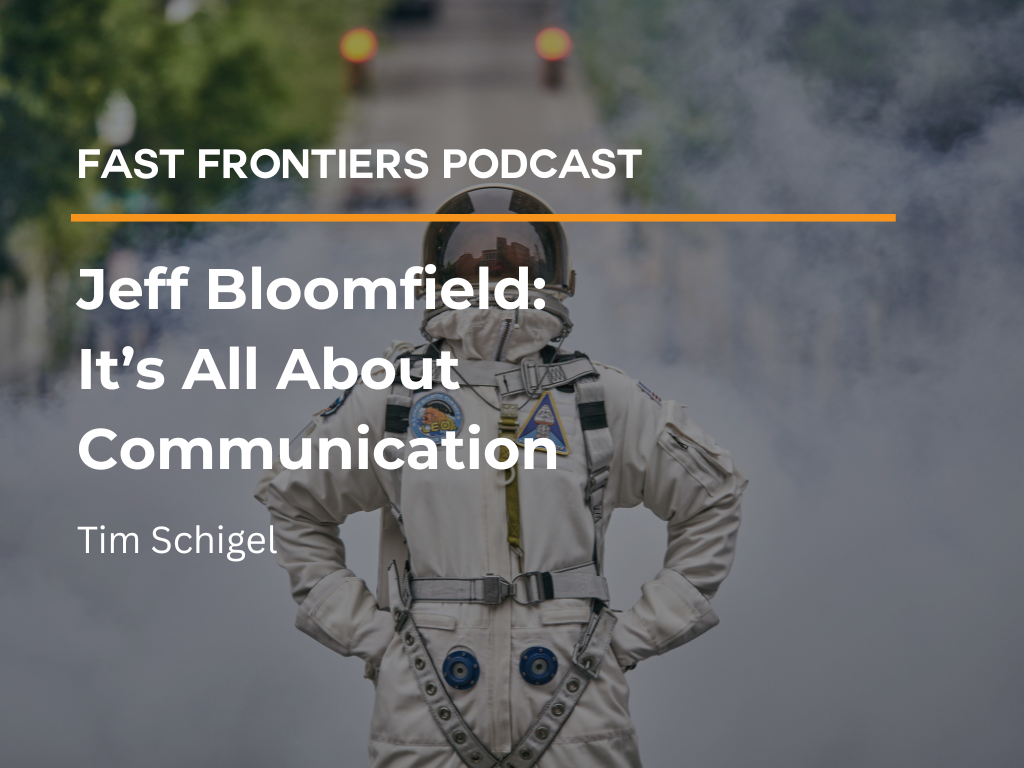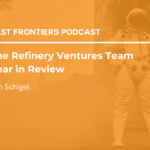In our first Season Four Fast Frontiers podcast, we had business on the brain. To kick off our fourth season, we sat down with author and CEO Jeff Bloomfield to explore the importance of communication and how neuroscience is helping us understand how our communication really works..
We were particularly looking forward to getting Jeff’s insights into how a better understanding of neuroscience can be an asset to entrepreneurs, as well as hearing about all of the lessons and wisdom he has retained throughout his career journey.
Among Jeff’s many gifts is his uncanny ability to tell a compelling story in a way that automatically draws you in. Case in point, Jeff started our podcast interview with his captivating origin story.
The Importance of Great Mentors
“It all started on a farm,” Jeff said. “I grew up on a hundred-acre farm in Northern Ohio, and my papaw, who was my grandfather, took his life savings in Kentucky and moved the family up, and he bought a hundred-acre farm, and that’s where I grew up, and I was attached to his hip. He was just this amazing mentor, teacher, communicator.”
Jeff remembers all the wise words his papaw would share, even to this day. Things like, “Hard work and perseverance, son, that always gets you ahead in life,” and “Problem solvers rule the world.”
But out of all the things that stand out to Jeff in his memory, it was his papaw’s unmatched gift of communication. “He was one of those great communicators, where he wouldn’t actually give you the answer to the problem; he would just keep asking you questions until you came up with a suitable answer that he felt was going to solve the problem.” He was also one of those men that, according to Jeff, “didn’t say a lot, but when he started talking, everybody else shut up.
“He had this other thing that we call in our family, the ‘platinum rule,’ and he would say that you treat other people better than they expected you to treat them, and not only does it benefit them, but it almost always comes back to benefit you,” Jeff admitted that he didn’t realize all the priceless things he was learning at the time. But he does now looking back, and after he lost his papaw to lung cancer, he took his legacy and determined to do him proud—and heed his (few, but powerful) words.
Part of honoring his papaw led Jeff to become the first person in his family to get a college degree (that’s what his papaw wanted) and end up in biotech, where he helped commercialize a drug for lung cancer. To say he was passionate about this due to his personal experience would be an understatement.
Jeff took that passion, work ethic, and many lessons and hasn’t stopped blazing trails since. Remembering the communicator that his mentor was and how he used storytelling to teach and connect on a deeper level than most would guide Jeff throughout the years.
It All Comes Down to Communication
If you were to ask Jeff today, he would tell you, without a doubt, it is all about communication., “The determining factor of success for a person, an individual, or an organization, is how successful you can communicate … If you can’t communicate effectively, you’re sunk, in every area of your life,” Jeff said.
And this rule of thumb is not just for high-level players in the business world either, as according to Jeff, it applies to every man, woman, and child in whatever sphere—and role— they find themselves in at any given time. “It doesn’t matter what sphere you’re in. It can be personal, marriages, being a parent. It can be a VC company, or you’re trying to go recruit investors. It could be a tech company trying to raise dollars … It doesn’t matter.”
We go even deeper when the conversation turns to the brain itself. Specifically, Jeff discussed how it operates and how that directly correlates with the importance of communication on every level, but especially in sales and business.
Jeff explained this all in simple terms for us—KISS if you will. He shared how the brain exists in two networks: the analytical network and the emotional empathic network. The big thing to remember about the pair is that you can’t activate them both at the same time.
The primary role of the analytical network is evaluation, analysis, and comparison. It’s not open to new ideas, and the only function it has in decision-making is validation and justification. The emotional empathic network is the opposite. It is open to new ideas, and the emotional aspect of feelings, trust, meaning, etc., initiates its decision-making.
The effect that knowing this has on how we communicate is astounding. It can be a powerful tool (especially in business and sales) once you can wrap your mind around it—then understand, anticipate, and make accommodation for—how others will respond and think. And this is all while you are attempting to communicate with (or sell to) them.
According to Jeff, our brains are geared in a way where buyers automatically assume, from a subconscious default setting, that salespeople are approaching them with an agenda—theirs and not ours. Jeff shared that when this happens, the emotion evoked in the buyers is generally an instant fear or possibly doubt or frustration. It’s not the most conducive environment, but there is good news, as Jeff explained that buyers “don’t stay in that emotional place.” Why? Because they can’t stay in that emotional place when faced with facts.
After the initial “analytical network” (looking through everything like that kneejerk, reactive lens of skepticism) kicks in, it can be counteracted with communication. It’s like flipping a switch—disarming the brain in a way—through conversation, which Jeff explained has the capacity to “activate the emotional empathic network” of the brain.
Jeff further explained that after this emotional empathic network is tapped into, “It becomes a more confirmatory process because I [as a buyer] want to believe you, because I trust you, or at least my instinct tells me that you’re trustworthy.”
Jeff shared many other fascinating insights, and we have just skimmed the surface. But hopefully, Jeff’s work has piqued your interest and tapped into your emotional empathic network, and you want to know more. The great news is you can find the full podcast episode here.



